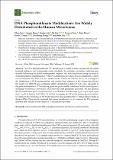| dc.contributor.author | Sun, Yihua | |
| dc.contributor.author | Kong, Lingxin | |
| dc.contributor.author | Wu, Guojun | |
| dc.contributor.author | Cao, Bo | |
| dc.contributor.author | Pang, Xiaoyan | |
| dc.contributor.author | Deng, Zixin | |
| dc.contributor.author | Dedon, Peter C | |
| dc.contributor.author | Zhang, Chenhong | |
| dc.contributor.author | You, Delin | |
| dc.date.accessioned | 2020-09-24T14:07:18Z | |
| dc.date.available | 2020-09-24T14:07:18Z | |
| dc.date.issued | 2020-08 | |
| dc.date.submitted | 2020-07 | |
| dc.identifier.issn | 2218-273X | |
| dc.identifier.uri | https://hdl.handle.net/1721.1/127687 | |
| dc.description.abstract | The DNA phosphorothioate (PT) modification existing in many prokaryotes, including bacterial pathogens and commensals, confers multiple characteristics, including restricting gene transfer, influencing the global transcriptional response, and reducing fitness during exposure to chemical mediators of inflammation. While PT-containing bacteria have been investigated in a variety of environments, they have not been studied in the human microbiome. Here, we investigated the distribution of PT-harboring strains and verified their existence in the human microbiome. We found over 2000 PT gene-containing strains distributed in different body sites, especially in the gastrointestinal tract. PT-modifying genes are preferentially distributed within several genera, including <i>Pseudomonas</i>, <i>Clostridioides</i>, and <i>Escherichia</i>, with phylogenic diversities. We also assessed the PT modification patterns and found six new PT-linked dinucleotides (C<sub>ps</sub>G, C<sub>ps</sub>T, A<sub>ps</sub>G, T<sub>ps</sub>G, G<sub>ps</sub>C, A<sub>ps</sub>T) in human fecal DNA. To further investigate the PT in the human gut microbiome, we analyzed the abundance of PT-modifying genes and quantified the PT-linked dinucleotides in the fecal DNA. These results confirmed that human microbiome is a rich reservoir for PT-containing microbes and contains a wide variety of PT modification patterns. | en_US |
| dc.description.sponsorship | National Natural Science Foundation of China (31630002, 31700029, 31770038 and 21661140002) | en_US |
| dc.description.sponsorship | National Key R & D Program of China (2018YFA0900400) | en_US |
| dc.description.sponsorship | National Science Foundation (CHE-1709364) | en_US |
| dc.publisher | Multidisciplinary Digital Publishing Institute | en_US |
| dc.relation.isversionof | 10.3390/biom10081175 | en_US |
| dc.rights | Creative Commons Attribution | en_US |
| dc.rights.uri | https://creativecommons.org/licenses/by/4.0/ | en_US |
| dc.source | Multidisciplinary Digital Publishing Institute | en_US |
| dc.title | DNA Phosphorothioate Modifications Are Widely Distributed in the Human Microbiome | en_US |
| dc.type | Article | en_US |
| dc.identifier.citation | Sun, Yihua et al. "DNA phosphorothioate modifications are widely distributed in the human microbiome." Biomolecules 10, 8 (August 2020): 1175 ©2020 Author(s) | en_US |
| dc.contributor.department | Massachusetts Institute of Technology. Department of Biological Engineering | en_US |
| dc.contributor.department | Massachusetts Institute of Technology. Center for Environmental Health Sciences | en_US |
| dc.relation.journal | Biomolecules | en_US |
| dc.eprint.version | Final published version | en_US |
| dc.type.uri | http://purl.org/eprint/type/JournalArticle | en_US |
| eprint.status | http://purl.org/eprint/status/PeerReviewed | en_US |
| dc.date.updated | 2020-08-21T13:51:29Z | |
| dspace.date.submission | 2020-08-21T13:51:29Z | |
| mit.journal.volume | 10 | en_US |
| mit.journal.issue | 8 | en_US |
| mit.license | PUBLISHER_CC | |
| mit.metadata.status | Complete | |
